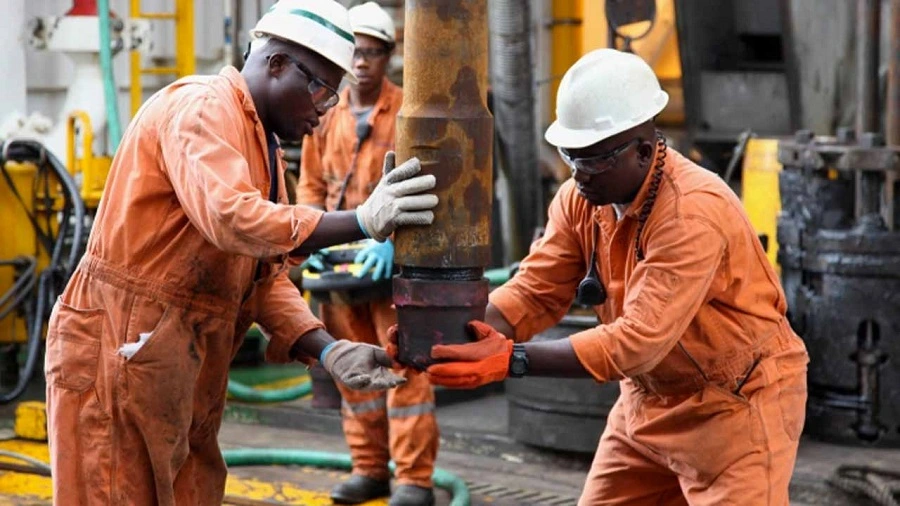Nigeria has ranked 11th position on a top-20 list of countries with largest proven oil reserves, a publication by Insider Monkey has shown.
Despite the impressive attainment on the list, Nigeria’s crude oil reserve has remained stagnant at 37 billion barrels for the past 10 years due to low exploration for new discoveries
According to the report, data from the Energy Information Administration (EIA) and other sources were used to sift out the largest countries with crude oil reserves as of 2021
Nigeria’s crude oil is one of the most preferred due to its low sulfuric content, and low corrosiveness to refinery infrastructure. It also has a lower environmental impact of its byproducts during the refinery process, putting its grade, Bonny Light as one of the most expensively priced and sold at the international market.
Key operators in the oil and gas sector have projected that Nigeria is well positioned not only to sustain its position as top oil producer in Africa but readjust upward its current status among 20 countries with largest oil reserves.
This according to experts would require urgent reforms and political willingness to implement key fiscal reforms and reassurances of return on investment by overhauling present security architecture.
Their reaction follows a recent report which placed Nigeria on the 11th position after taking a look at the 20 countries with largest oil reserves in the world heading into 2023.
The report placed Nigeria after the Republic of Kazakhstan with oil reserves of 30 billion barrels as of 2021.
The country supplied 1.68 million barrels of oil in 2022, and its government owned oil company KazMunaiGaz (KMG) listed its shares on the stock market for the first time in December 2022.
Nigeria’s reserves was put at 36.89 billion barrels in 2021 and reportedly produced 1.13 million barrels of oil in November 2022.
The United States of America, queued behind Nigeria with reserves of about 47.10 billion barrels of oil as of 2020, while the state of Libya boosts of 48.36 billion barrels in 2021.
In her opinion Mrs. Tunbosun Afolayan, executive director ProAlly Energy and energy sustainability expert says Nigeria is well positioned to surpass its present reserves if right fiscal policies are put in place.
Afolayan, told LEADERSHIP that if Nigeria is willing to reduce cost of production by incentivizing operators through rebates, infrastructure development, tax holiday as obtains in other climes, investment inflows into the industry will create opportunities for more discoveries.
According to her, Nigeria has not fully tapped potentials in the sector and growing insecurity is further creating investor apathy which has recently led to production decline.
Recall that Angola produced more crude oil than Nigeria for the third consecutive month, after Nigeria lost 74,000 barrels per day in July compared with the previous month of June. In May and June, Angola produced more crude oil than Nigeria, despite an increase in the country’s output. The Organization of Petroleum Exporting Countries, OPEC’s monthly report for July showed that Nigeria’s oil production declined by 74,000 barrels per day (bpd) to 1.08 million bpd in July from 1.26 million in June, based on direct communication.
On its part, Angola’s oil production rose to 1.18 million bpd in July, up from 1.17 million bpd in June. OPEC uses secondary sources to monitor its oil output, but also publishes a table of figures submitted by its member countries. Nigeria recorded the second greatest decline in production among its OPEC peers in July, even though Angola’s also reduced, it still overtook Nigeria in terms of barrels drilled.
On his part, Dr. Muda Yusuf, Chief Executive Officer, CEO, of the Center For The Promotion Of Private Enterprise, CPPE, expressed similar confidence that Nigeria has the potential to overtake key oil producing nations listed in the report.
He posited that the enactment of the Petroleum Industry Act [PIA] was a major step towards the reform of the oil gas sector which promises to transform the sector through the creation of a legal and regulatory framework that would inspire much higher levels of investors’ confidence.
He said Nigerians would want to see greater commitment to the implementation of the PIA, adding that, “The deregulation of the petroleum downstream sector is a major economic reform imperative. This is inevitable if we must unlock investment in the sector and put an end to the perennial fuel scarcity and the monopolistic structure of the sector.”
Meanwhile, Chief Timipre Silva, Minister of Petroleum Resources, says one of the key mandates of the ministry is to grow oil reserves from the current 37 billion barrels to 40 billion barrels by 2025.
This is evident following the official ground-breaking of the Oil Prospecting Licenses (OPLs) 809 and 810 at the Kolmani River II well located at a border community between Bauchi and Gombe states by President Muhammadu Buhari.
Speaking at the event, the Minister said, “This is a testimony of the fact that the hydrocarbons sector still holds the promise of returns on investment, highlighting the role that this resource will continue to play in the global energy mix,”.
He recalled that in 2019 when the Nigerian National Petroleum Company Limited, NNPCL, announced that it had encountered oil in ‘commercial quantities’ at the Kolmani River well II, the nation celebrated the news as a fitting outcome for years of geological investigations.
“In spite of the enormity of challenges that NNPCL, was confronted with, the day has come when we can collectively witness and celebrate drilling for hydrocarbons in the North of our dear country,”.
He said the ministry was committed to finding and developing ways to end energy poverty, create shared prosperity and enthrone sustainable development. Sylva said the Petroleum Industry Act (PIA) provided regulatory support and framework for achieving this mandate by providing Frontier Exploration Fund which the NNPC could utilise to deploy world-class cutting-edge technologies to de-risk exploration in frontier basins.
“The commencement of drilling of Kolmani fields which could hold as much as one billion barrels crude oil reserve will significantly contribute in boosting our oil reserves and ensuring our continuous energy sufficiency,” he said.
Meanwhile, Nigeria’s crude oil production is recovering, climbing right back to about 1.6 million barrels as at December.
Chief Upstream Investment Officer, NNPCL, Upstream Investment Management Services, Bala Wunti, said this at the 11th Practical Nigerian Content forum in Uyo, Akwa-Ibom.
According to him, Nigeria’s oil production was 1. 6 million barrels per day, from 937, 000 barrels per day reported in September.
Wunti maintained that the output increase was a result of the government’s rectangular approach to the fight against crude oil theft.
“Crude theft affects all architecture that funds the country. When the oil theft reached its peak, everything including gas production was affected,” he said.
He said, “One, we have security agencies in which the Navy, the police, and everyone within that space was involved. The second is the regulators angle. At this stage, all regulators are made to fully be part of the efforts. Third is the operators’ angle. And, of course, all operators were involved. The fourth angle is the community angle in which all impacted communities have to be brought under the umbrella of a structured arrangement in the collective effort against crude oil theft. In all, these efforts were able to do three things; Detect, deter and respond appropriately.
“As at today, oil production is at 1.59 million barrels per day,” he said.
Nigeria has been unable to meet OPEC production quota in the last one year.
At the September Federation Account Allocation Committee, a Nigerian National Petroleum Company Limited presentation said Nigeria lost as much as 8.14 million barrels in August.
Available data shows that contribution of the oil sector to the Gross Domestic Product of the country fell to 5.7 per cent in the third quarter of this year.
The National Bureau of Statistics, NBS, in its GDP Sector Report, had said that the oil sector’s contribution of 5.7 per cent in Q3, 2022, was a decline when compared to a 6.3 per cent real GDP contribution recorded in Q2-2022.
The report stated that Nigeria’s average crude oil production in Q3-2022 was 1.2 million barrels per day (including condensates), lower than Q3-2021’s 1.6 million barrels per day, a 23.6 per cent decline.
The Ministry of Finance, Budget and National Planning said the excess crude account crashed by 89 per cent in the last eight years, moving from $4.1bn in November 2014 to $472,513 in the same period of 2022.The balance as of November 23, 2022, stood at $472,513.64.
The account has depleted in the last eight years as a result of lack of inflows, oil market vagaries and the country’s revenue crunch, according to reports.





